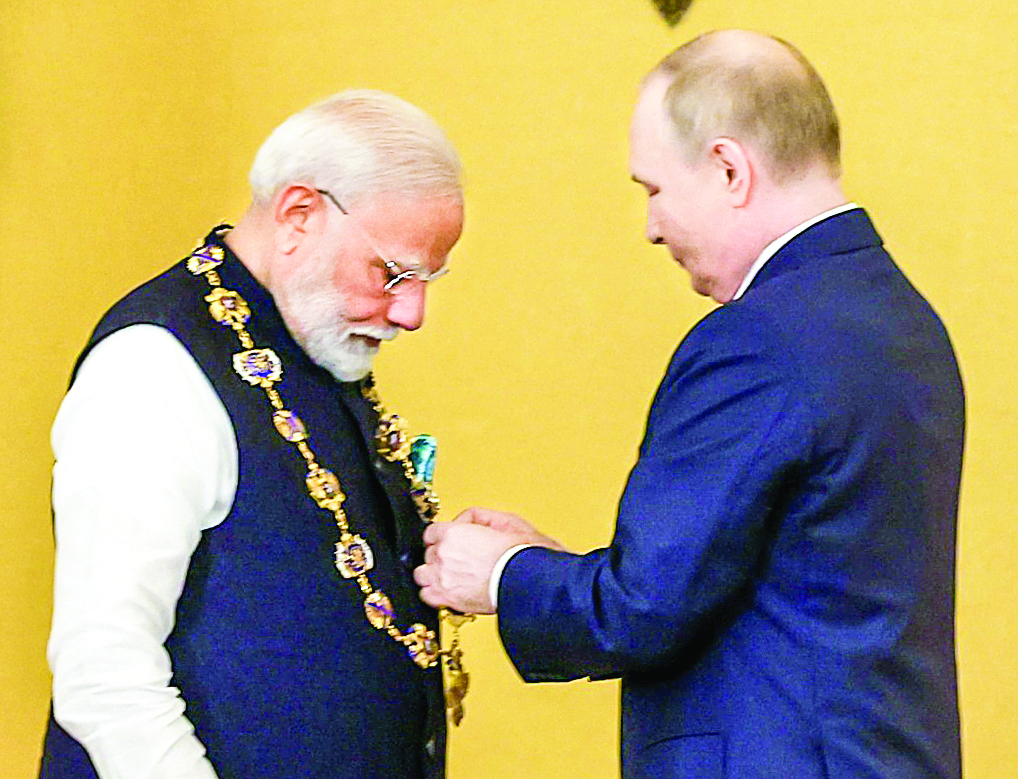Kazan, Russia: The overarching agenda of India at the BRICS Summit in Russia’s Kazan will be to manage the expansion of the grouping in a manner conducive to the interests of the Global South.
With the future of BRICS emerging as an arena of contest and power play, Prime Minister Narendra Modi heads to the Russian city of Kazan to participate in the 16th summit of the plurilateral grouping, which is expected to add at least 10 countries as partners in the expanded BRICS.
It is fitting that BRICS 2.0 will be consolidated in Russia, which hosted the first summit of the grouping in Yekaterinburg in 2009. Besides the existing members, the expanded BRICS+ will comprise diverse countries, cutting across geographies and continents.
The addition of more countries as “partner countries” will top the agenda of the largest summit of BRICS, which Russian President Vladimir Putin will host in the capital of Tatarstan on October 22-24. Prime Minister Narendra Modi will join around 40 other prominent leaders to participate in regular and Outreach/BRICS Plus sessions.
The 16th BRICS Summit will take place against the backdrop of an unprecedented churn in the world order. Crises and conflicts are proliferating, and geopolitical fault lines are deepening. In this age of poly-crisis and paranoia, trust deficit is growing amid competitive games for power and domination. It’s also a time of structural changes in the international system and multilateralism—the old order is crumbling, but the outlines of an emerging world order are only dimly visible.
The motto of the Russian presidency of BRICS is “Strengthening Multilateralism for Equitable Global Development and Security.” The two focus expressions here are “Strengthening Multilateralism” and “Equitable Development,” which encapsulate the future direction of BRICS as well as the emerging world order. It is this quest for equity and inclusion, which is driving a large number of countries, ranging from Thailand and Vietnam to Cuba and Senegal to join the BRICS.
FOCUS ON GLOBAL SOUTH
The overarching agenda of India at the BRICS summit in Kazan will be to manage the expansion of the grouping in a manner conducive to the interests of the Global South, and to prevent Chinese domination of the grouping.
Thirty-four countries have formally applied for BRICS membership. Around 10-15 countries are expected to be included as partner countries at the Kazan summit, which will pave the way for their inclusion as new members at the next summit in 2025. Under the modalities worked out by the Russian presidency, each BRICS member country will share its list of favourite candidates. Based on the lists provided by 9 member countries, 10-15 countries will be chosen for the partner country status.
RACE TO JOIN BRICS
The BRICS summit in Kazan will be marked by intense contestation and lobbying by aspiring countries and their backers to become members of BRICS. The founding members of BRICS, including India, China, and Russia, will be engaged in intense negotiations to ensure that countries friendly to them get inside the grouping. The Russian presidency has spelt its criteria for including new partner countries and members. These criteria include: I) Aspiring country should have good relations with other BRICS members; II) Aspiring country should not support sanctions against another BRICS country; III) Aspiring country should be economically ambitious; IV) Aspiring country should support global governance reforms, including reform and expansion of the UN Security Council. By and large, India is supportive of these criteria, but it has also its own benchmarks for supporting an aspiring country. In New Delhi’s view, any prospective country should not have hostile relations with India. Judged against this yardstick, India is opposing Pakistan’s candidature, which is backed by China. Top sources disclosed that besides adversarial relations, India feels that Pakistan’s inclusion will not add any value to BRICS. India will ensure that the character of BRICS as a grouping of emerging market economies is retained, rather than becoming a platform reflecting geopolitical conflicts between neighbours, said sources.
THE ROAD AHEAD
India will also make sure that the BRICS does not become an anti-West platform. In his remarks at the summit, PM Modi is expected to project BRICS as a force for global public good and peace and harmony in the world. India will team up with non-aligned countries in the BRICS+ grouping, especially those countries that have good relations with the West, to counter the agenda by some countries to convert BRICS+ into an anti-West alliance.
Ahead of the summit, Putin quoted PM Modi to argue that the BRICS group is not anti-West, but it will drive much of global economic growth in the coming years. “BRICS was never meant to be against anyone. Indian Prime Minister Narendra Modi has also stated that BRICS is not an anti-Western group but a non-Western group,” Putin said ahead of BRICS summit.
India’s primary focus at the BRICS will be to use the grouping to push for accelerating reform and expansion of the UN Security Council and other key global governance institutions. PM Modi is expected to raise its pitch for global governance reforms as the increase in membership will also raise BRICS’ collective bargaining power vis-à-vis global governance reforms.
Looking ahead, India, the largest democracy in the grouping, will play the keystone role in shaping the future evolution of BRICS as the pre-eminent forum of the Global South as a majority of countries in the expanded grouping will be developing countries. The expanded BRICS+ will complement efforts of India in other multilateral groupings such as G20 to place interests and priorities of the Global South on the international agenda.
Manish Chand, is CEO, Centre for Global India Insights, a think tank focused on global affairs, and Editor-in-Chief, India Writes Network and India and the World. He is in Kazan to report on and analyse BRICS summit.

